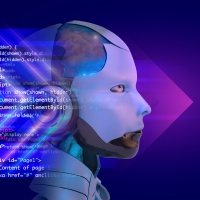- 存檔
- 2023
AI: threat or opportunity
An advanced system based on artificial intelligence, known as Skynet, has suddenly become self-aware and decides to destroy human civilization. This is the Terminator movie scenario; A scenario that makes many, especially the public, suspicious of artificial intelligence.
The company “OpenAI” has developed an AI chatbot that can perform various tasks from writing articles to drafting business plans, and makes humans think that in the not-so-distant future, machines will replace humans.
But is artificial intelligence really a threat to humanity?
The first question is whether it is possible for artificial intelligence to reach a level comparable to human intelligence.
Based on the author’s perspective, artificial intelligence will go much further. The only reason we still can’t build systems comparable to humans, or even an insect, is scientific and technological limitations, but these limitations may overcome in the near future. However, it is not necessary that artificial intelligence to be better than humans to be considered a threat.
Both science and technology are ultimately tools, and how and for what purpose they are used is ultimately up to the user. Artificial intelligence is no exception to this rule.
By using the language model known as GPT-2, it is possible to generate a fake news report containing special journalistic literature just by receiving one or more simple sentences. Deepfake technology can remember every facial expression of a person and produce a convincing fake video of the person. It is essential to prioritize the ethical use of AI to avoid exploitation and safeguard individual rights.
But from another side, this approach can combat with artificial intelligence itself. For example, artificial intelligence can play a critical role in identifying fake news or distinguishing real images from fake ones. In addition, it is possible to implement a system for verifying multimedia content. For example, every photo and video with a news aspect is digitally signed by a trusted source that publishes it and has a unique identifier to block fake news. Or again, by using artificial intelligence, among other methods, real users of social networks can be differentiated from fake users who publish fake news or propaganda.
Imagine your insurance company knows about your personal habits and lifestyle by analyzing public data that you share on Instagram or by accessing the list of your financial transactions and knowing when and where you spend your money. For instance, if you used the card reader of a fast food several times a week, it may assume that you have a habit of consuming high-fat foods. Or if you have paid the amount equivalent to speeding fines to the police several times, it may conclude that you have a habit of driving over the speed limit. Therefore, based on these findings, it may conclude that you are most likely a high-risk customer for his economic interests and refuse to serve you and opt to choose less risky customers. One of the important solutions to prevent this from happening is establishing robust rules to protect users’ privacy. For example, the adoption and implementation of the GDPR (the General Data Protection Regulation) by the European Union was a significant step in this direction.
But in general, today, even with advanced AI applications like ChatGPT, humans remain very valuable in the workplace and cannot be completely replaced by AI. First of all, AI lacks emotional intelligence. Many tasks, such as business growth, social activities and etc., require establishing human relationships. It is far from the mind that even the most appreciative artificial intelligence machines can replace these relationships and humans can create a strong emotional connection with these machines. It is important to note that a key factor in understanding how AI works is that it only works with the data it receives. Therefore, when it comes to creative ideas and problems-solving, AI lacks this human ability. A significant issue with AI chatbots like ChatGPT is that they are often inaccurate and require fact-checking by human observers. Admittedly, AI is capable of learning very quickly, But it lacks the power to think and is not able to reason and examine the facts to the extent that a human can. In summary, AI is not to be afraid of but a tool for improving the way work is done.
LSCM – Aysan Esmradi

